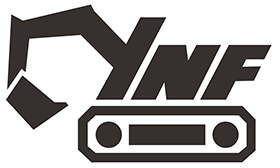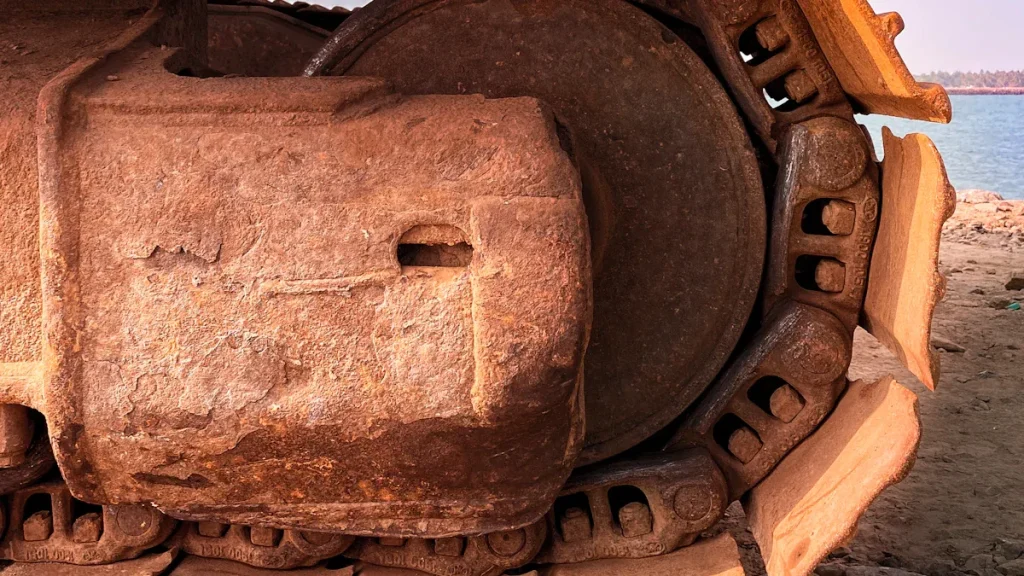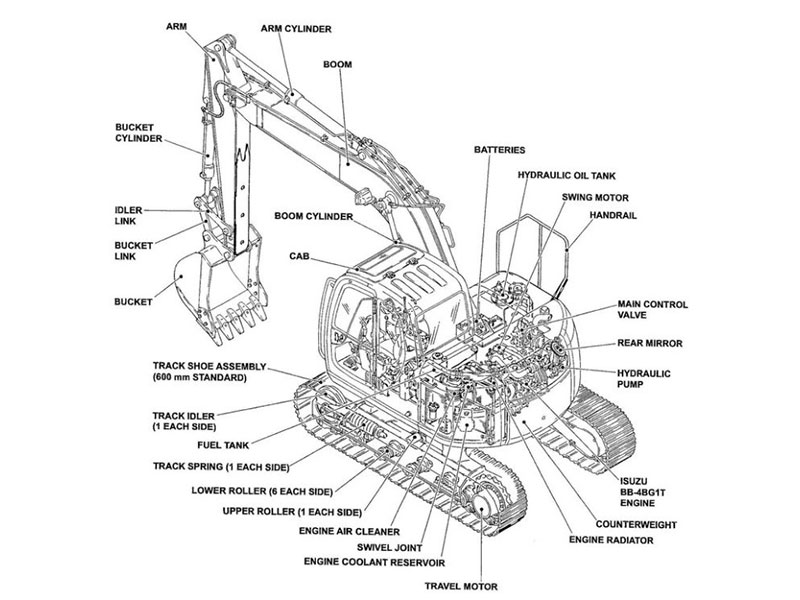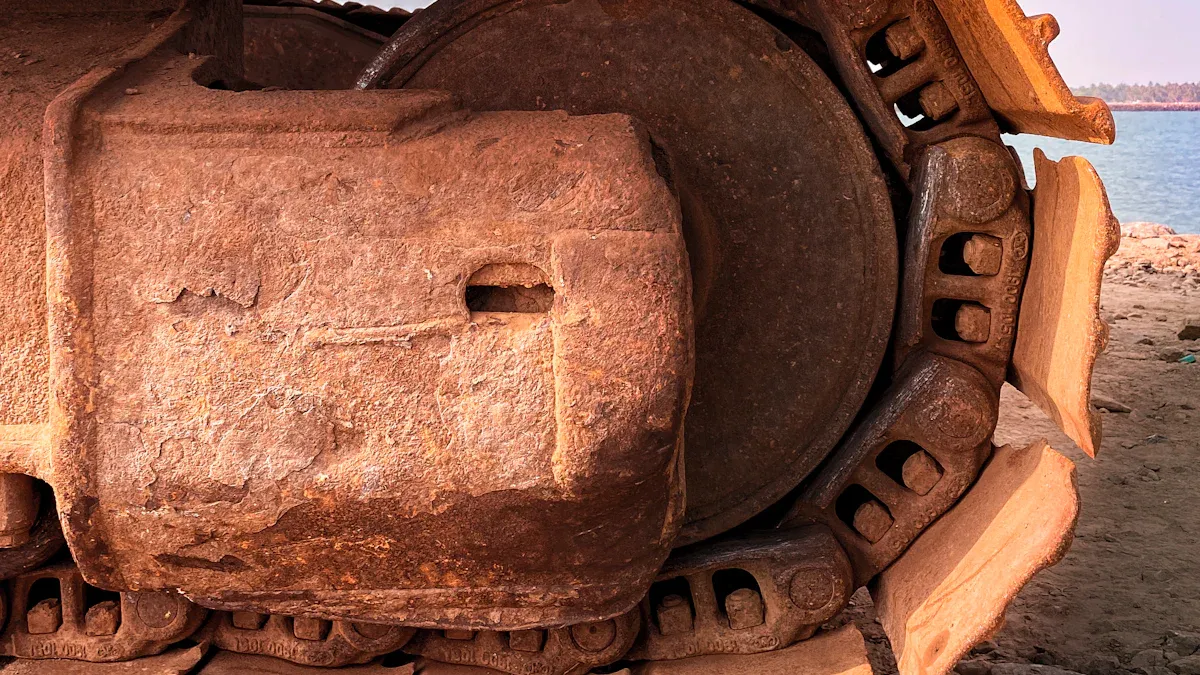
You want your excavator to work safely and well. Picking the right excavator replacement parts protects your money and keeps jobs moving. Manuals and dealer guides give you part numbers and codes for the right choice. Experts say to use original manufacturer excavator parts and certified dealers. This lowers problems from wrong replacement parts. Trusted sources help you stay away from fake excavator accessories. They make sure every excavator component fits your machine’s model. When you check details with these guides, you lower risks and keep your excavator working its best.
Key Takeaways
Always use the correct parts for your excavator’s model and serial number. This helps keep your machine safe and working well.
Buy parts from trusted dealers or official sellers. This helps you avoid fake or bad parts that can break your machine and cost a lot to fix.
Check part numbers, packaging, and warranties before you buy. This makes sure the parts fit and protects your money.
Use OEM parts for important systems like hydraulics and engines. These parts fit best and work well. You can use good aftermarket parts for less important needs.
Check important parts like hydraulic components, motors, and tires often. This helps stop problems and keeps your excavator working smoothly.
Why Compatibility Matters
Safety and Performance
You need your excavator for hard work every day. Using the right, good parts keeps it safe and working well. The correct parts stop leaks and sudden breakdowns. Strong hydraulic seals and tough steel pins help your excavator last longer. These parts make the machine steady and easy to control. You can trust your excavator on every job.
Better parts also save fuel and let you work longer before repairs. You spend less time fixing and more time working. Many contractors say they have fewer problems and get more done with stronger parts. When you pick parts that fit, you avoid failures that slow you down or put people at risk.
Cost and Downtime
Picking the wrong parts can cause big problems and cost a lot. Cheap or fake parts often make things worse. Here are some risks when you use bad or wrong parts:
Your excavator may stop working for a long time
Bad parts can make work unsafe for people
Your excavator may not last as long
The machine may not work as well if parts do not match
No warranty means you pay for repairs yourself
Bad parts can wear out other parts you cannot see
Your machine may sell for less money later
Tip: Always buy from trusted dealers and check part numbers before you buy. This helps protect your money and keeps your excavator working well.
When you use the right parts, you avoid extra costs and finish jobs on time. You also lower the chance of legal trouble and losing money from buying from bad sellers. Picking parts that fit is not just about size. It keeps your machine, your team, and your money safe.
How to Choose Excavator Replacement Parts
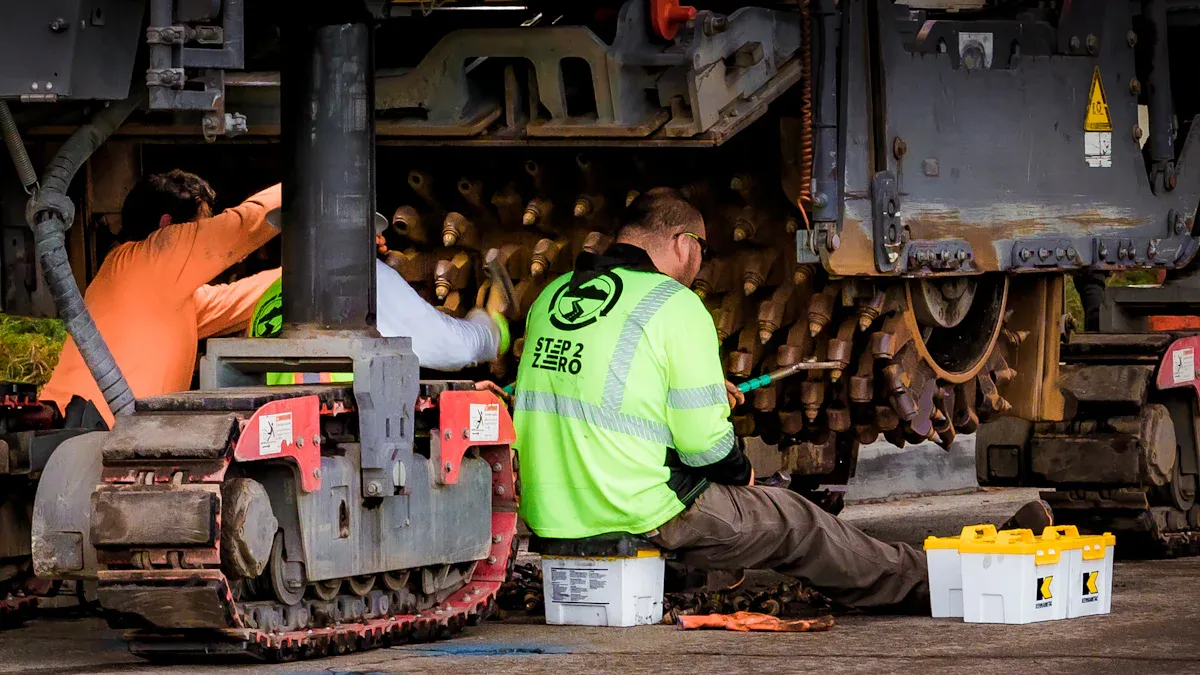
Picking the right excavator replacement parts helps your machine work well and stay safe. You need to follow steps to avoid mistakes and save money. Use this guide to make sure each part fits your excavator and does what you need.
Identify Model and Serial Number
First, find your excavator’s model and serial number. These numbers help you order the right wheel excavator parts and avoid mistakes. Here is what you should do:
Look for the serial number plate on the frame near the boom, engine bay, or cab.
Do not use the engine serial number. That number is only for engine repairs.
Check if the serial number is old or new. Older excavators may have 13 digits. Newer ones use 17-digit VINs.
The 10th character in a 17-digit VIN tells you the model year.
If you cannot find the plate, clean the area and use a flashlight or mirror to look for stamped numbers.
If you still cannot find it, check the operator manual or service records.
Ask your dealer for help if you still have trouble.
Tip: You need the right model and serial numbers to order the correct excavator spare parts and wheel excavator parts.
Check the Equipment Manual
Your equipment manual is very helpful when picking excavator accessories. It gives you:
Manufacturer tips for which excavator parts fit.
Real part numbers and markings to match the original.
Warnings about using fake or wrong parts.
Advice to talk to a technician before using other brands.
Steps to keep your warranty safe and avoid fake wheel excavator parts.
Always read the manual before you buy. This helps you pick good parts and avoid mistakes.
Verify Part Numbers
You must check part numbers before you buy any excavator replacement parts. Here is how:
Look at the packaging for clear labels and instructions. Bad packaging can mean fake excavator accessories.
Buy from sellers with a good reputation for quality excavator parts.
Check parts for cracks, leaks, or damage, especially on wheel excavator parts.
Use tools to check if the part is in good shape.
Look at warranties and certifications like ISO, CE, or OEM.
Compare prices and read reviews. Very cheap parts may be bad quality.
Ask experts, mechanics, or OEM staff for advice.
Note: Always check wheel excavator parts for wear, rust, or damage. Ask for maintenance records and check warranty terms to protect your money.
OEM vs Aftermarket Parts
You can pick OEM parts or aftermarket excavator spare parts. Each has good and bad points. Use this table to compare:
Factor | OEM Parts | Aftermarket Parts | Recommendation |
|---|---|---|---|
Cost | Higher price, but lower long-term cost due to reliability | Lower initial cost, wide price range | Budget jobs → Aftermarket; Critical parts → OEM |
Quality | Consistent, manufacturer-approved, long lifespan | Quality varies; premium brands near OEM quality | Non-critical → Aftermarket; Hydraulics/engine → OEM |
Compatibility | Guaranteed fit, no modifications needed | May need adjustments; premium brands offer OEM-equivalent | Older machines (OEM discontinued) → Aftermarket; Precision → OEM |
Lead Time | Longer delays, depends on OEM stock | Faster shipping, widely stocked | Emergency → Aftermarket; Scheduled → OEM |
Warranty | 1–2 years, protects new machine warranties | Varies by supplier; some limited warranties | Warranty buyers → OEM; Out-of-warranty → Certified aftermarket |
OEM parts come from the original maker. They always fit and meet high standards. You get full warranty and they work well with your excavator. Aftermarket wheel excavator parts can save money and are easier to find for old machines. But quality is not always the same. Always check brands and make sure they fit before you buy aftermarket excavator accessories.
Start with Official Dealers
Official dealers help you find the right excavator replacement parts and wheel excavator parts. They use your model and serial number to match parts. Here is how they help:
Search for parts using model or serial numbers on official websites.
Give you clear descriptions, diagrams, and details.
Offer advice from trained staff.
Use apps like SIS2.0, SIS2GO, or Cat Central to show diagrams and check parts.
Check parts for the right size, weight, and packaging.
Look for real labels and warranties to make sure parts are real.
Talk to technicians to confirm the best fit for your excavator.
Picking official dealers keeps your money safe. You get real, high-quality parts made from good materials. This lowers the chance of problems and keeps your excavator working well.
When you follow these steps, every excavator part and accessory will fit your machine. You avoid downtime, keep your warranty, and get the most from your money. Always choose quality and compatibility, not just price.
Key Excavator Spare Parts to Consider
When you take care of your excavator, focus on the most important excavator spare parts. These parts wear out first and can stop your machine if you ignore them. Knowing which excavator accessories and wheel excavator parts need checks helps your machine work well and stay safe.
Hydraulic Components
Hydraulic components are very important for your excavator. You need these excavator spare parts for power and control. The hydraulic system has pumps, hoses, seals, filters, and main control valves. Piston pumps are best for most machines over 2 tons. They handle high pressure and last longer. Always match the pump to your excavator’s size and job. Clean hydraulic oil and strong filters keep dirt out and stop damage. Good hoses and safety release valves stop leaks and keep pressure safe. Better hydraulic controls make your excavator easier to use. They also let you use more excavator accessories.
Tip: Check and change hydraulic oil, filters, and seals often. This easy step stops most problems in the hydraulic system.
Travel and Swing Motors
Travel and swing motors help your excavator move and turn. These wheel excavator parts carry heavy loads every day. If your machine moves slowly or makes odd sounds, you may need new excavator spare parts. Motors must fit your machine’s model and power. Using the wrong travel or swing motor can break your machine or make it unsafe. Always pick good excavator accessories and wheel excavator parts for these jobs.
Control Cabin Parts
The control cabin keeps you safe and comfortable. Important excavator spare parts here are joysticks, sensors, control boxes, and display panels. These excavator accessories help you control the machine well. Bad sensors or old joysticks can cause mistakes or unsafe work. Check these wheel excavator parts often and replace them if they look worn or broken.
Tires and Axles
Tires and axles hold up your excavator and help it move on rough ground. These wheel excavator parts get a lot of stress, especially on rocky job sites. Worn tires or broken axles can cause accidents or slow your work. Always pick the best wheel excavator parts for your machine. Look for cracks, uneven wear, or low tread. Change these excavator spare parts before they break to keep your machine safe and working.
Some excavator spare parts you may need to replace are:
Hydraulic oil and filters
Track shoes and rollers
Bucket and arm accessories
Hydraulic seals
Sensors and control boxes
When you pay attention to these key excavator accessories and wheel excavator parts, you have less downtime and save money on repairs. Doing regular checks and changing these excavator spare parts on time keeps your machine ready for any job.
Mistakes to Avoid with Excavator Parts
Ignoring Model Differences
Not all wheel excavator parts are the same. Each machine needs special parts. Brands like Caterpillar and Komatsu use different sizes and features. If you use the wrong part, your machine may not work well. It can wear out faster or even break down. Your excavator might lose digging power or move slowly. Always check the serial number and OEM codes before buying. Two parts can look alike but not fit or work the same. If you ignore this, you waste money and need more repairs.
Overlooking Supplier Reputation
Where you buy wheel excavator parts is important. Some suppliers sell weak parts that break fast. These parts can cause more repairs and problems. You might have more breakdowns and pay more for insurance. It can also be unsafe to use bad parts. If the supplier has poor support or no warranty, it gets worse. You may not find new parts when you need them. Always check reviews and ask about service plans. Trusted dealers give you better parts and help when you need it.
Tip: Pick suppliers who use good materials and give strong warranties. This saves you money and keeps your machine working.
Prioritizing Price Over Quality
Cheap wheel excavator parts may seem like a good deal. But they often skip important quality checks. They do not meet industry standards. These parts wear out fast and cause more downtime. Good parts last longer and keep your machine safe. If you pick price over quality, you may need more repairs. Your machine may use more fuel and not last as long. High-quality parts use strong materials and pass tough tests. They help your machine do hard jobs and need fewer replacements.
Common Signs Your Wheel Excavator Parts Need Replacement
Slow movement or weak digging power
Strange sounds like grinding or knocking
Leaks from seals or hoses
Tracks wearing unevenly or slow hydraulics
If you see these signs, replace your wheel excavator parts soon. Check your machine often and use the right parts. This protects your money and keeps your work on schedule. Ignoring quality or compatibility can cause bigger problems and cost more.
Final Checks Before Purchase
Confirm Compatibility
Before you buy any excavator replacement part, you need to double-check that it will fit your machine. Start by matching the part number with your excavator’s model. This step helps you avoid costly mistakes and keeps your equipment running smoothly. Always check the specifications, such as size and material, to make sure you get compatible parts. Use trusted dealer websites or official catalogs to compare details. If you want to be sure, measure the old part using the right tools. Check the pin-to-pin length, width, and pin diameter. This careful step helps you confirm the new part will fit.
You should also look for OEM markings. These show the part comes from the original manufacturer. OEM parts give you peace of mind because they meet strict quality standards. When you buy from reputable suppliers, you lower the risk of getting the wrong part. Reliable sellers provide clear compatibility information and answer your questions. If you follow these steps, you can trust that your excavator will work well with the new parts.
Tip: Avoid ordering the wrong part. Double-check every detail before you pay.
Review Return Policies
Even when you check everything, mistakes can happen. You need to know the seller’s return policy before you buy. Look for these important details:
Report defects or wrong items within 24 hours to 7 days.
Return quality goods within 14 days, unused and in original packaging.
Keep all proof of purchase and fill out any return forms.
The seller may refuse returns if you do not follow the rules.
For defective parts, the seller pays for return shipping.
For other returns, you may pay for shipping.
Refunds usually take 7 to 14 days after the seller gets the part back.
If you need to return a part, contact the supplier first. Ask for a return number and pack the part carefully. Make sure the part is unused and undamaged. If you meet all the conditions, you will get a refund or a replacement. Knowing the return policy protects your money and helps you shop with confidence.
You can keep your excavator safe and protect your money by doing these important things:
Pick OEM parts because they fit well and work best.
Look at part numbers and details to make sure they match.
Buy from good sellers who have great reviews and help you.
Good sellers give you real parts, quick delivery, and clear info about what fits.
Strong parts last longer and stop your excavator from breaking, so you save money.
Always ask experts or check official guides before you buy. Their help stops mistakes and keeps your machine safe and working well.
FAQ
What should you do if you cannot find your excavator’s serial number?
Check your operator’s manual or service records first. Clean the frame near the boom or cab. Look for numbers stamped into the metal. If you still cannot find it, ask your dealer for help.
Can you mix OEM and aftermarket parts on your excavator?
You can use both, but check if they fit together. Use OEM parts for important systems like hydraulics or engines. For less important parts, good aftermarket parts might work. Always make sure the part fits and is good quality before you put it in.
How often should you replace hydraulic filters and oil?
Follow the schedule in your equipment manual. Most experts say to change hydraulic oil and filters every 500 hours. Dirty oil or clogged filters can hurt your excavator’s hydraulic system.
What are signs that a replacement part does not fit correctly?
The part does not line up with mounting spots.
You see spaces or loose parts.
The machine makes strange sounds after you put it in.
Tip: Stop using your machine if you see these problems. Check the part number again and talk to your dealer.
Where can you find trusted suppliers for excavator parts?
Look for trusted sellers on official dealer websites or in manufacturer catalogs. You can also find them at industry trade shows. Always read reviews and ask for certificates. Good sellers have clear return rules and warranty details.
